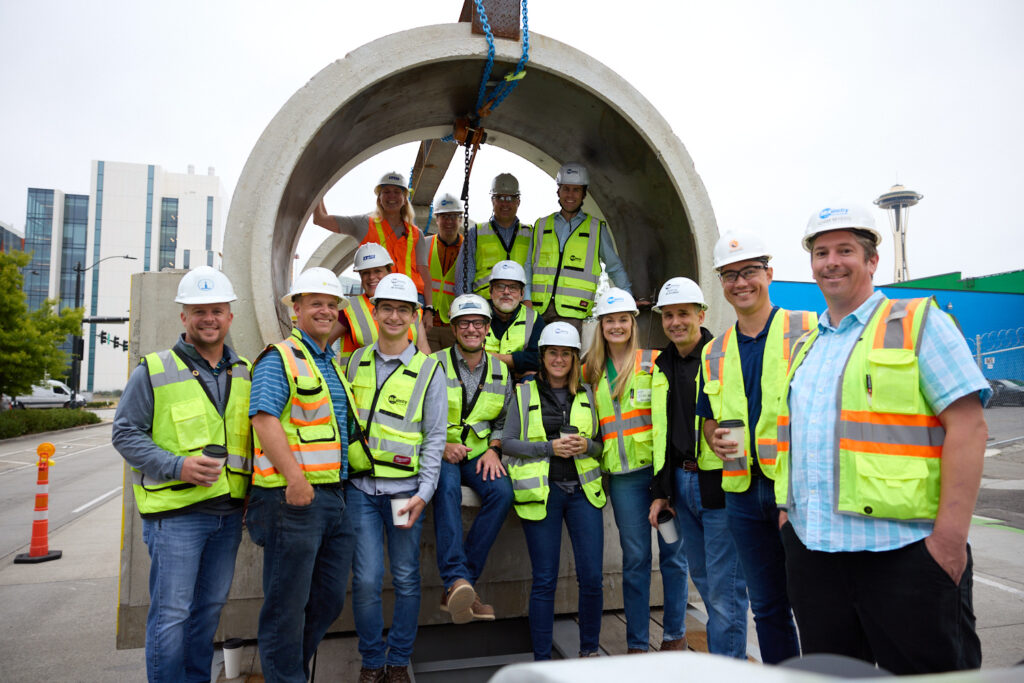- All Posts
- King County and Alexandria Real Estate Equities, Inc. Launch Sewer Heat Recovery System at South Lake Union Energy District
King County and Alexandria Real Estate Equities, Inc. Launch Sewer Heat Recovery System at South Lake Union Energy District
SEATTLE, WA – King County’s Wastewater Treatment Division and Alexandria Real Estate Equities, Inc. have launched King County’s first sewer heat recovery project at the Alexandria Center for Life Science – South Lake Union, a five-building, 1.6 million-square-foot mixed-use life science mega campus. This is one of the first large commercial projects in the nation to draw heat from the sewer system as a renewable energy source for buildings and is expected to provide 70% of campus’ heating. As a result of this project being the first of its kind in King County, WA, Alexandria Real Estate Equities, Inc has won the 2024 Energy Vision Award at the Seattle 2030 District Vision Awards on April 25, 2024.
The heat recovery technology will draw heat from a county sewer pipe and send it through a heat pump system and network of pipes to heat the campus’s buildings, with the first phase installed below-ground at Alexandria’s 701 Dexter Avenue North development. The system is expected to come online in 2025. The temperature of wastewater in the sewer system averages 70 degrees, a consistent and reliable temperature for heat transfer.
“I want to make it easier for more commercial buildings in King County – home to many of the world’s leading tech companies – to adopt advanced technology that provides a reliable, sustainable, renewable energy source for heating and cooling,” said King County Executive Dow Constantine. “Applying proven sewer heat recovery technology is the latest progress we’ve made to re-engineer our region’s built environment, making the places where we live, work and gather more energy efficient to cut greenhouse gas emissions.”
The project is a significant step forward in King County’s plans to develop commercial interest in sewer heat recovery and to partner with the private sector on innovative solutions to save energy costs and reduce greenhouse gas emissions. Commercial and multi-family buildings account for 22% of countywide greenhouse gas emissions.
“As the preeminent owner, operator and developer of collaborative life science mega campuses, Alexandria has long been a leader in sustainability,” said Eleni Reed, senior vice president and head of sustainability at Alexandria Real Estate Equities, Inc. “Our South Lake Union Energy District demonstrates our innovative approach to decarbonizing our laboratory buildings. This large-scale wastewater heat recovery system will provide an alternative energy source to heat our buildings and will improve building resiliency and operating performance.”
Recognizing the untapped benefits of sewer heat recovery, the King County Council authorized the Wastewater Treatment Division to launch a pilot program, and in 2020 the Division began accepting applications for three spots in the program for commercial users. Alexandria is the first project to move forward with installation. There are two spots remaining in the pilot program.
The project reached a major milestone this summer when McKinstry cut and connected the County’s original 100-year-old brick-lined main sewer line to Alexandria’s system, proving that such a system can be installed in a dense, urban landscape. McKinstry is Alexandria’s trusted design-build partner working to deliver on the South Lake Union Energy District vision. McKinstry worked alongside Alexandria around enabling legislation, code reviews, permitting and thermal energy agreement models along with project engineering, design and construction.

“The innovative South Lake Union Energy District is one of the largest sewer waste heat recovery systems in North America, heating more than 1.6 million sqft of office and lab space in the heart of Seattle’s growing life sciences hub,” said Ash Awad, McKinstry President and CMO. “The all-electric energy district creates construction jobs for our local economy while saving 810,000 kWh of energy each year as part of King County and Seattle’s decarbonization efforts.”
The heat exchange system is manufactured by British Columbia-based SHARC Energy and can be used for both heating and cooling purposes. As an alternative to traditional energy sources, King County’s sewer system heat is expected to reduce carbon emissions by 99% compared to a typical laboratory building in Seattle.
King County is encouraging other commercial real estate entities to apply for the two remaining open spots in the pilot. Users pay King County for costs associated with reviewing project designs as well as a use fee of one-half cent per ton-hour of energy transferred following the first three years of service.
The benefits to commercial users are reduced energy costs; contributions to green building certification; financing supports such as King County’s C-PACER Program that help developers meeting stringent energy codes; and significant reductions in potable water use. In the future, projects may be eligible to earn state renewable energy credits, making these projects even more financially attractive.
Explore Other Insights

McKinstry’s Pride Alliance
McKinstry Alliances are our version of employee resource groups or affinity groups. Alliances are voluntary, employee…

McKinstry Alliance Leader Reflects on Juneteenth Legacy
On June 19, 1865, months after the Civil War ended and more than two years after President Lincoln signed the Emancip…

Celebrating Father’s Day
Father’s Day serves as an opportunity to recognize and celebrate those shaping lives and communities through fatherho…